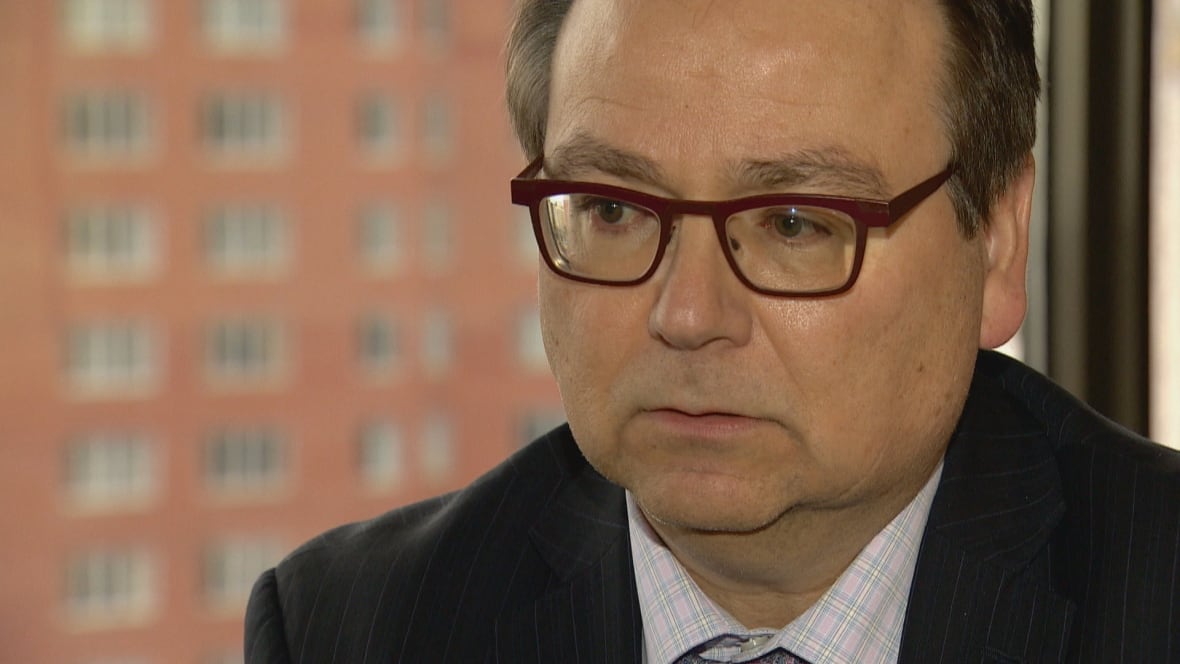Public understanding of Alberta's energy war room a problem, CEO says
The Canadian Energy Centre turns one year old on Friday

The head of the Canadian Energy Centre (CEC) says there's still not a good public understanding of what the provincial corporation does, even one year after its launch.
Tom Olsen, the CEO of the Alberta government's energy war room, admits there's not as much awareness or engagement as he would like by this point.
"There's not a huge knowledge of what we do and how we do it and how we benefit the world," he said.
The CEC turns one year old on Friday and its path to this anniversary has been full of missteps.
When Premier Jason Kenney unveiled his promised energy "war room" last December, he explained how it would promote Alberta oil and gas, counter misinformation, gather data and produce media content with its annual budget of $30 million (this has been cut considerably during COVID-19).
But the CEC ended up making headlines for different reasons.
The first year
Out of the gate, the website launched with a logo already in use by an American tech company. Not even two weeks later, war room staff were found to have identified themselves as journalists in phone conversations.
Then, the organization questioned the New York Times' credibility in a post on Twitter. It has also been criticized for misrepresenting data and statistics on Canada's energy sector.
Olsen is pleased with this first year, but keenly aware of the mistakes made along the way.
"It's been a difficult journey," he said.
In the last 12 months, Olsen said the centre has produced 30 research briefs on Alberta's oil and gas industry, along with running a marketing campaign across Canada.

Working to boost the profile of the centre is going to be a big focus of the team's projects for 2021, along with amplifying the potential of oil and gas in Canada's economic recovery post-pandemic.
This year is expected to be the worst year ever for drilling activity, according to the Canadian Association of Oilwell Drilling Contractors. Oil companies have spent much of 2020 laying off workers and reducing capital spending plans.
Olsen is trying to address visibility issues with billboards across Vancouver and Toronto.
"The target is outside the province and we will continue to focus on that," he said. "We will continue to grow our network."
He added he thinks the team has already come a long way since the launch.
"We are advocating on behalf of the industry and, I believe, doing so effectively."
Less consensus in oilpatch
In the oilpatch, there's less consensus on the centre's success.
"I'd say that the CEC has not been as effective as it should have been," said Ryan Williams, the president of Drake Oilfield Supply.
Williams added that no one knows about the centre outside the oil and gas industry.
"If all you're doing is targeting the people that already agree with you, you're not able to get to the rest of them," he said.
The Canadian Association of Petroleum Producers said in a statement it "appreciates the strong voice of the Canadian Energy Centre," as oil will play a role in Canada's economic recovery.
The centre's launch from the starting blocks quickly turned into a faceplant, which Olsen partly attributes to the timeline — he had seven weeks to turn a mandate, an office space and some desks into a fully loaded operations centre.
"If I was to do it again, I would look for a little more preparation time," he said.

Lori Williams, a political scientist at Mount Royal University, said there have been so many mistakes that the centre will struggle to redeem its credibility.
"Their launch was accompanied by a series of scandals," she said.
"They set themselves up as a war room against environmentalists, so from the get-go they hobbled their ability to do what they needed to do, which is to appeal to those who could be persuaded to support this kind of energy."
Williams said switching from attack to promotion mode is a way for the centre to improve its image. She suggested this could include partnering with industry and environmental leaders and contracting an independent energy economist to do original research.
She said without a rethink, the centre won't be successful.
"It looks like it has an agenda and only collects information to support that agenda."
Auditor general report
The centre came under fire again a few months ago when it was a subject of the auditor general's report.
Doug Wylie scolded the CEC for financial oversight issues and awarding sole source contracts. He recommended the centre improve its documentation to be more transparent.
The province has said all the auditor general's recommendations have been adopted.

Olsen said there was no formal contracting process in place when the centre launched — something that was rectified in June.
"They had at one point five auditors looking at all of our contracts, expenditures of $1.8 million over a five-month period of time," he said.
"We now have formally-in-place policies that address the recommendations of the auditor general."
Ryan Williams said the $30 million set aside for the centre doesn't bother him, but he wants to see its strategy pivot to better communicate news about Alberta oil and gas.
"How do we get that message out? And I think that's where they need to reevaluate what they're doing," he said.
"As a taxpayer, I'd want to see better value and a more thorough message getting out."